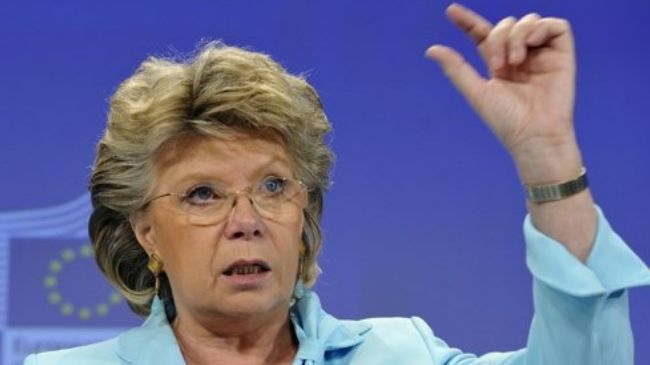EU calls on UK to give urgent answers to spying revelations

The UK government’s spying scandal is causing concerns among Europeans with the EU chief justice writing to British authorities demanding urgent answers.
The EU’s Justice Commissioner Viviane Reding has written to Foreign Secretary William Hague demanding answers by the end of the week on leaked reports that Britain’s spy services are tapping cables that carry the world’s phone calls and Internet traffic.
“I have sent a letter to express my concern,” Reding told a briefing on Wednesday, adding: “I have asked for a very urgent reply by the end of this week.”
The EU chief justice demanded answers about the scope and extent of the online eavesdropping program and called for clear answers about the alleged details published in British papers this week.
The revelations, published by The Guardian newspaper, are based on leaked documents from U.S. former intelligence contractor Edward Snowden, who has been accused by the White House of espionage.
The report on the British programme codenamed Tempora has sparked a fresh outcry from privacy campaigners.
Reding said she had asked Hague to “clarify the extent of the programme, whether the data stayed in Britain or was passed to other countries, whether the spying was limited to individual cases and what the possibilities for legal redress were”.
“It is a very clear signal that we need… the right balance between the protection of data and the processing of data for security reasons,” Reding said.
The Guardian reported on Saturday that Britain’s Government Communications Headquarters (GCHQ) has started processing vast amounts of personal information — including Facebook posts, emails, Internet histories and phone calls — and was sharing it with its US partner the National Security Agency (NSA).
The United States and Britain are facing mounting criticism for spying on their own citizens, however, London remained defiant, defending the spying programs and its intelligence sharing with Washington.
In a speech in the U.S. on Tuesday night, William Hague defended joint UK-U.S. spying programmes, claiming they were conducted within a strict legal framework.
William Hague again dismissed concerns on Tuesday in a speech at the Ronald Reagan Library in California, saying Britain should have nothing but pride in its “indispensable” intelligence-sharing relationship with the US.
“Let us be clear about it: in both our countries intelligence work takes place within a strong legal framework. We operate under the rule of law and are accountable for it. In some countries secret intelligence work is used to control their people – in ours it only exists to protect their freedoms.”
However, in an article published by The Guardian, the former Conservative leadership contender David Davis disputed Hague’s claims, saying Britain’s intelligence agencies are only subject to law in theory.
He accused GCHQ of circumventing “inconvenient laws” by handing over personal data to the U.S. and raised the prospect of “extremely serious violation” of the rights of British citizens over the use of their personal data.
The leading German social democrat, Thomas Oppermann, has said the details of Project Tempora make it sound as if George Orwell’s surveillance society has become a reality in Britain.
On Tuesday night the British inventor of the internet accused the West of hypocrisy over online snooping.
Sir Tim Berners-Lee told the Times: “In the Middle East, people have been given access to the internet but they have been snooped on and then they have been jailed.
“Obviously, it can be easy for people in the west to say, ‘oh, those nasty governments should not be allowed access to spy’. But it’s clear that developed nations are seriously spying on the internet.”
The Guardian said the documents it had seen showed that by last year, GCHQ was handling 600 million “telephone events” each day, had tapped more than 200 fibre-optic cables, and was able to process data from at least 46 of them at a time.







